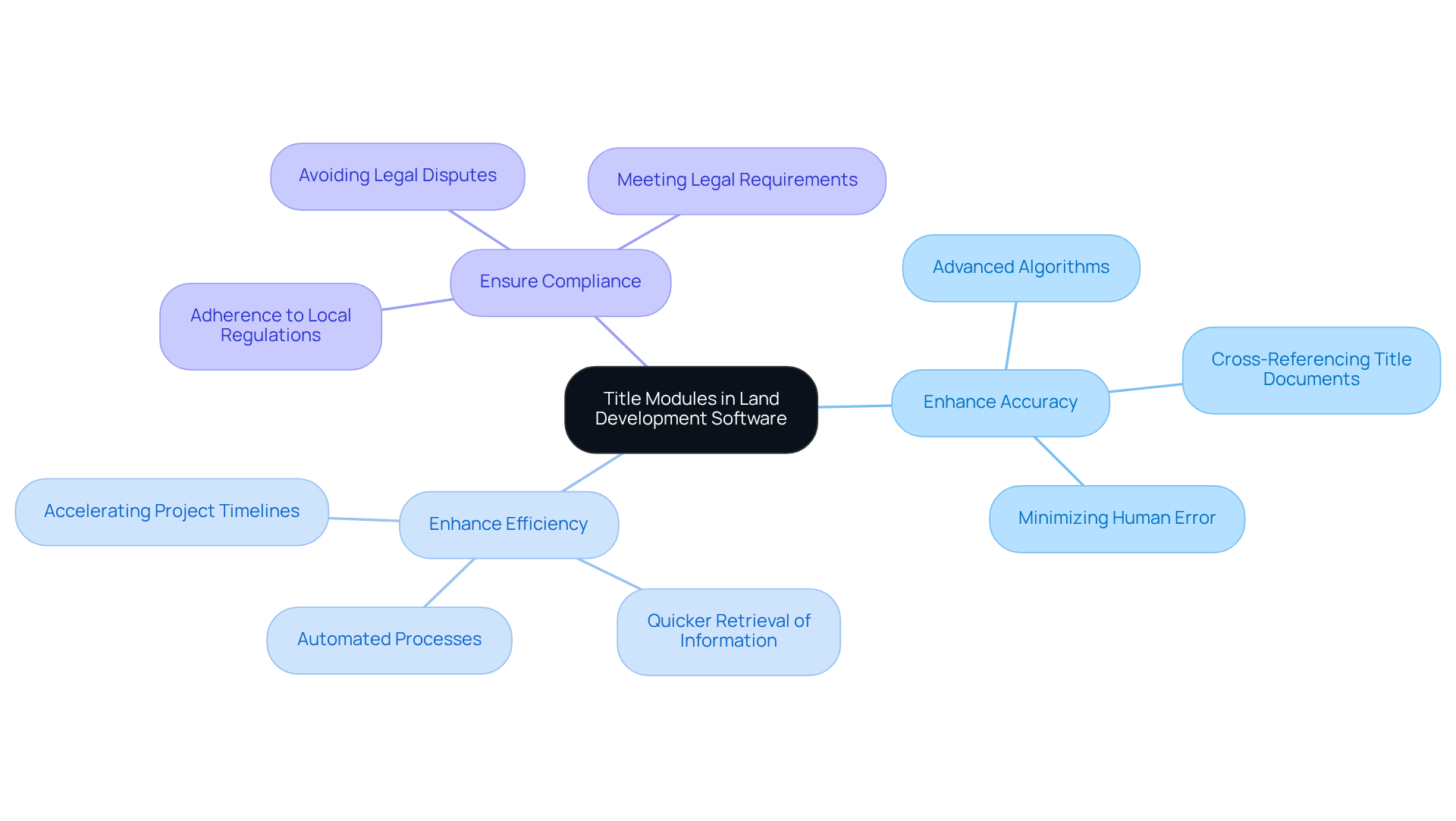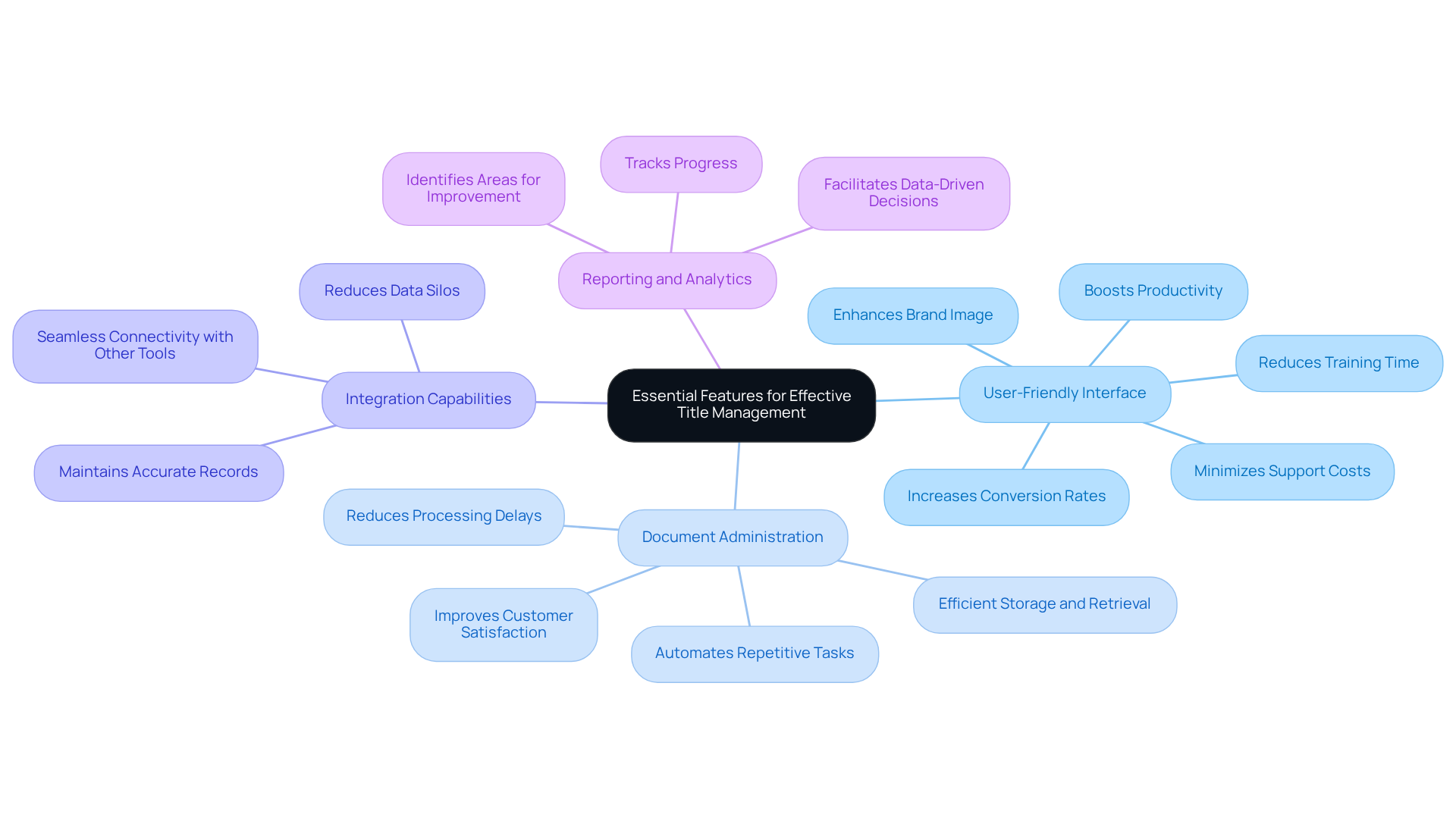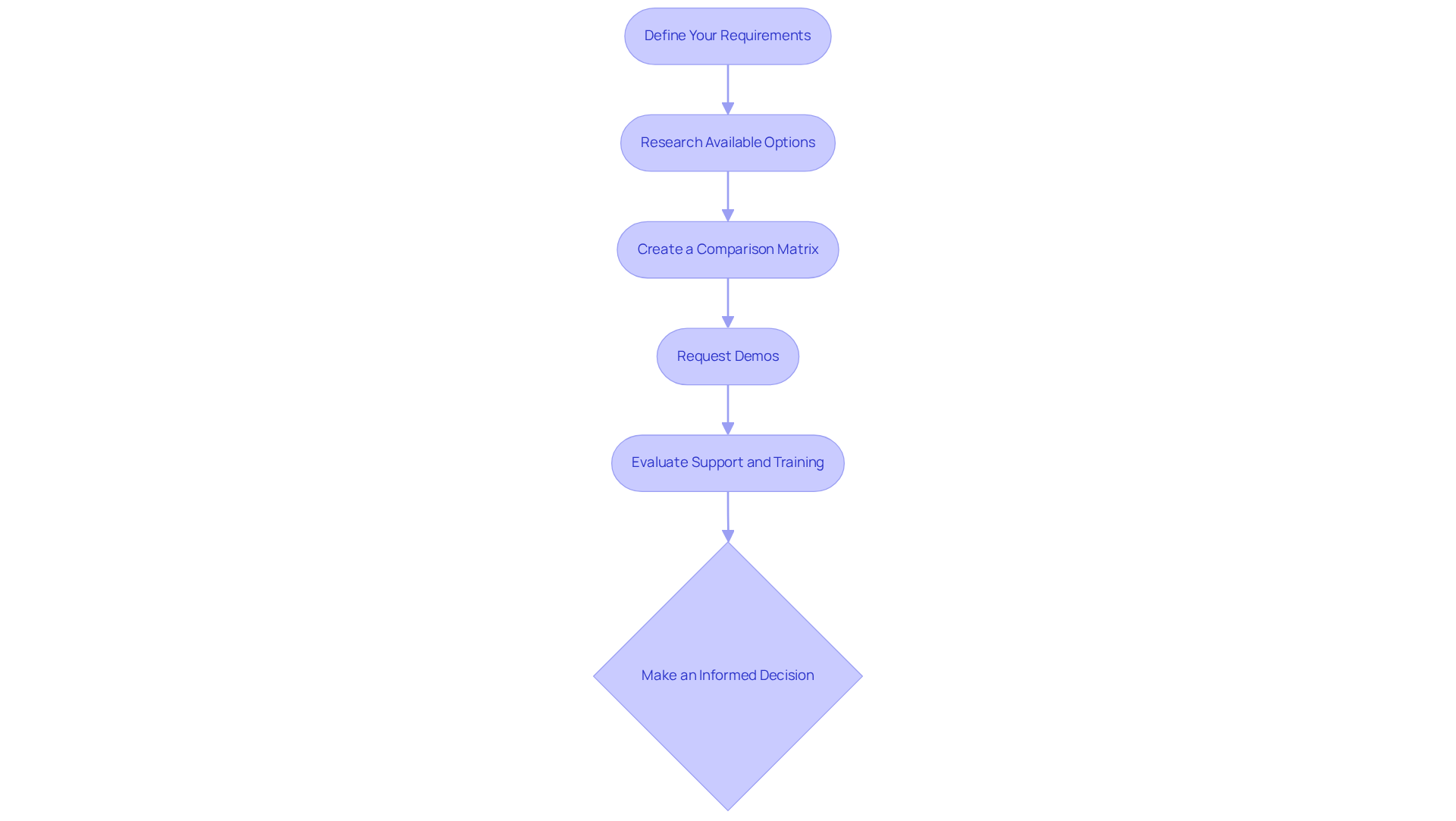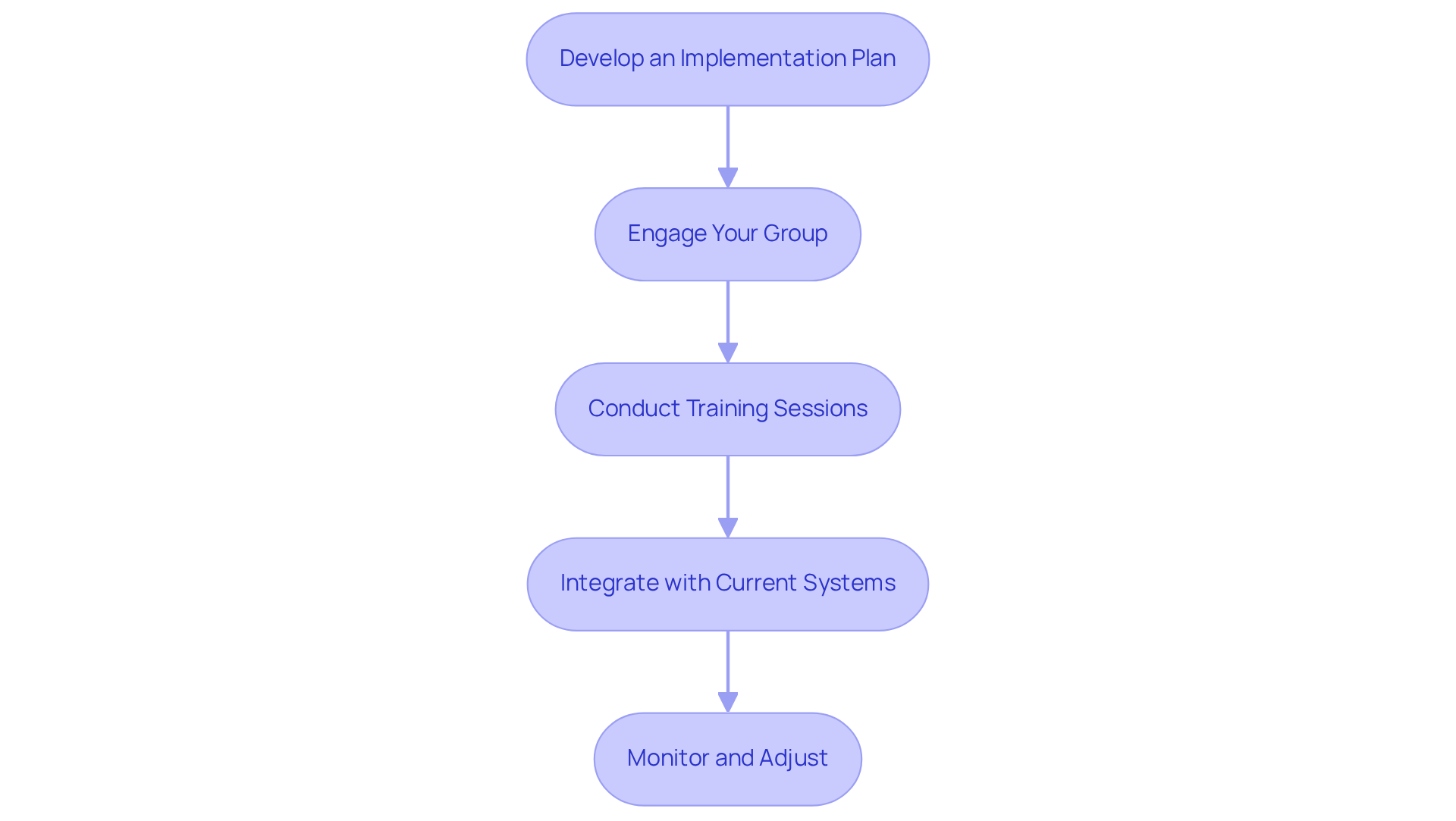Overview
The article emphasizes the mastery of land development software through the strategic utilization of title modules, structured within a comprehensive four-step process. It underscores that the integration of title modules significantly enhances accuracy, efficiency, and compliance in property research—elements that are vital for successful land development. This assertion is substantiated by a thorough exploration of the benefits and essential features of these modules, establishing a compelling case for their adoption.
Introduction
The landscape of real estate development is rapidly evolving, with technology playing a pivotal role in shaping project management. Title modules within land development software have emerged as essential tools that streamline the research process and enhance accuracy, efficiency, and compliance. As real estate professionals navigate the complexities of property ownership and legal requirements, a critical question arises: how can mastering these title modules transform workflow and lead to greater success in a competitive market?
Understand the Importance of Title Modules in Land Development Software
Naming modules are vital components of , specifically designed to oversee and streamline the research process. They facilitate the verification of property ownership, ensuring that all legal requirements are fulfilled before any development commences. By integrating title modules, real estate professionals can:
- Enhance Accuracy: Title modules employ , significantly diminishing the risk of human error. This precision is essential, as even minor inaccuracies can result in .
- Enhance Efficiency: and analysis of information, considerably accelerating project timelines. For instance, it is noted that , highlighting the importance of effective property research in wealth accumulation.
- Ensure Compliance: These modules assist in maintaining adherence to local regulations and legal standards, which is crucial in avoiding potential legal disputes. As Suze Orman states, "… both financial affluence and emotional security," emphasizing the .
Integrating components related to ownership into your land development software with title modules not only streamlines the research process but also provides a competitive edge in the fast-paced real estate market. As the market evolves, leveraging these innovations in document handling applications will be essential for success.

Identify Essential Features for Effective Title Management
When assessing program tools, recognizing is crucial. Consider the following key elements:
- : A clean and intuitive interface facilitates easy navigation, significantly reducing training time and . User-friendly designs not only enhance operational efficiency but also reflect positively on brand image, conveying professionalism and trustworthiness. Furthermore, such interfaces can lead to higher conversion rates and reduce support costs by minimizing user queries and confusion.
- : Efficient storage, retrieval, and oversight of records are essential for maintaining organized documentation. Incorporating electronic management tools improves efficiency and customer satisfaction, guaranteeing that users can swiftly retrieve essential information, thereby reducing delays in the processing workflow. Automating repetitive tasks, such as title creation, document generation, and notifications, through saves considerable time and diminishes the likelihood of errors. This streamlining of processes is vital for real estate professionals who require accuracy and speed in their operations.
- : Ensure that the software can seamlessly integrate with other tools utilized, such as Dealer Management Systems (DMS) or Customer Relationship Management (CRM) platforms. This connectivity enhances operational efficiency by maintaining accurate records and reducing data silos.
- : Robust reporting features enable tracking of progress and identification of areas for improvement, facilitating data-driven decision-making. By leveraging analytics, groups can refine their processes and enhance overall performance.
Focusing on these features will assist you in choosing land development software with title modules that aligns with your group's specific needs, ultimately improving efficiency and productivity.

Compare Software Options Based on Your Team's Specific Needs
To effectively compare software options, follow these steps:
- Define Your Requirements: Clearly outline your team's , encompassing , budget constraints, and integration capabilities. As Laura Schomaker emphasizes, "What exactly is it that my business needs from ERP?" Understanding these requirements is crucial for assessing the ROI of .
- Research : Utilize online resources, reviews, and pertinent case studies, such as the one on 'Identifying Business Needs for ERP Implementation,' to gather extensive information on various with . This research will provide insights into the strengths and weaknesses of each option.
- Create a Comparison Matrix: Develop a matrix that outlines the features, pricing, and user feedback for each application option. This visual tool facilitates the identification of solutions that align with your criteria and helps visualize the pros and cons of each choice.
- Request Demos: Arrange demonstrations with to observe the tools in action. This step enables you to inquire about specific aspects of functionality, support, and customization options. Engaging with vendors during this process is essential; their willingness to collaborate can indicate their suitability for your business.
- : Assess the level of offered by each provider. Effective assistance and training are crucial for ensuring your group can employ the application to its full potential, ultimately boosting productivity and project results. With the conclusion of on October 14, 2025, it is essential to confirm that your selected applications will fulfill your requirements going forward.
By systematically evaluating application choices, you can make a well-informed decision that not only enhances your group's efficiency but also aligns with your overall project objectives.

Implement and Integrate the Selected Software into Your Workflow
To effectively implement your chosen title management software, adhere to the following steps:
- Develop an : Create a comprehensive plan that outlines the timeline, key milestones, and responsibilities. This plan functions as a roadmap, guaranteeing all group members comprehend their roles and the project's goals, especially in employing .
- Engage Your Group: Actively involve group members in the implementation process. Collecting their feedback not only meets their needs but also encourages a sense of ownership, which is essential for successful implementation. Research shows that organizations with involved groups experience a considerable increase in productivity, frequently surpassing 20%, enabling employees to concentrate on more significant tasks.
- : Arrange comprehensive training sessions to acquaint your group with the application's features and functionalities, particularly the and research automation provided by Parse AI. Effective training boosts user confidence and ensures that the application is utilized to its full potential, enabling faster and more accurate title research.
- Integrate with Current Systems: Work together with your IT department to guarantee with current systems, such as project management and accounting tools. Successful integrations can improve interdepartmental collaboration by up to 25%, breaking down data silos and enhancing workflow efficiency, particularly when .
- Monitor and Adjust: After implementation, continuously observe the system's performance and seek user feedback. This iterative process permits prompt modifications, guaranteeing that the application addresses changing requirements and enhances its influence on group productivity.
By following these steps, you can facilitate a successful integration of land development software with title modules into your workflow, ultimately enhancing your team's efficiency.

Conclusion
Integrating title modules into land development software is crucial for optimizing the research process, ensuring compliance, and enhancing overall efficiency in real estate projects. By adopting these specialized tools, professionals can significantly reduce errors, streamline workflows, and maintain adherence to legal requirements, ultimately leading to more successful and timely project completions.
This article outlines key considerations for selecting and implementing title management software, emphasizing the importance of user-friendly interfaces, robust document administration, and seamless integration capabilities. Furthermore, it highlights the necessity of thorough comparison and evaluation of software options based on specific team needs, ensuring that the chosen solution aligns with organizational goals. Engaging team members throughout the implementation process and providing adequate training are crucial steps that contribute to maximizing the software's potential.
As the real estate market continues to evolve, leveraging advanced technologies like title modules is not just beneficial but imperative for maintaining a competitive edge. By prioritizing effective title management, real estate professionals can enhance their operational efficiency, minimize risks, and ultimately secure valuable assets that contribute to long-term success. Embracing these strategies will pave the way for more informed decision-making and sustainable growth in land development projects.
Frequently Asked Questions
What are title modules in land development software?
Title modules are vital components of land development software designed to oversee and streamline the research process, specifically focusing on verifying property ownership and ensuring legal requirements are met before development begins.
How do title modules enhance accuracy in property research?
Title modules utilize advanced algorithms to cross-reference title documents, significantly reducing the risk of human error, which is critical as even minor inaccuracies can lead to costly delays or legal issues.
In what way do title modules improve efficiency in land development?
Title modules automate processes, allowing for quicker retrieval and analysis of information, which accelerates project timelines significantly.
Why is compliance important in land development, and how do title modules assist with it?
Compliance is crucial to avoid potential legal disputes, and title modules help maintain adherence to local regulations and legal standards, ensuring that all necessary requirements are fulfilled.
What is the significance of property research in wealth accumulation according to the article?
The article notes that 90% of all millionaires acquire their wealth through real estate ownership, highlighting the importance of effective property research in building wealth.
How do title modules provide a competitive edge in the real estate market?
By streamlining the research process and integrating ownership components into land development software, title modules enable real estate professionals to operate more efficiently and effectively, giving them a competitive advantage in a fast-paced market.




